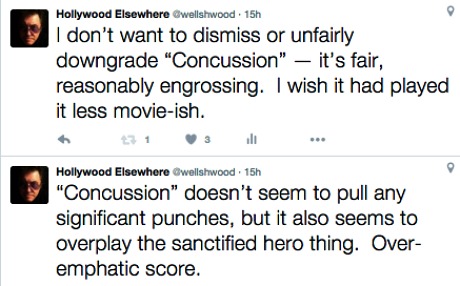The Hollywood Reporter‘s Scott Feinberg is reaching when he claims that last night’s Concussion screening confirmed that Will Smith‘s performance as real-life NFL whistleblower Dr. Bennet Omalu is a serious Best Actor threat. Smith delivers a better-than-decent performance, nicely augmented by what sounded to my white-ass ears like a believable Nigerian accent, but at best he’s a mild Best Actor threat. If he gets nominated, fine…but the film won’t bounce him into contention. Smith will need “sell it” on his own. Can he? Does he care to?


Peter Landesman‘s NFL-related drama is smart and credible in many respects, but also inconclusive as one is left wondering two things at the conclusion: (a) why doesn’t Omalu accept a prestigious and influential Washington, D.C. job that he’s offered at the finale, as his revelations about CTE (chronic traumatic encephalopathy) result in his being threatened and marginalized during the whole film, and so the D.C. job would refute all that while affirming his cultural standing, which the audience would take comfort in, and (b) what can be done to prevent football players from being afflicted by CTE (chronic traumatic encephalopathy) short of quitting the game? No one in the film ever talks solutions — just the importance of getting the NFL to admit the problem exists.
The bottom line is that Concussion is interesting and well-ordered and nothing if not earnest, but it’s a little bit shy of riveting. The most it can hope for is to make a pile of dough. Award-season contention is out, trust me. In large part, I feel, because of James Newton Howard‘s overbearing score, which isn’t just bad but Amistad-bad.
This means the springboard effect won’t kick in on Smith’s behalf and that he’ll have to hold the spotlight all on his own. And that means he’ll be nominated or not based on (a) whether people are hugely or somewhat impressed with his African accent but (b) whether or not mentions of God-inspired destiny will become a plus or a minus in this liberal, laissez-faire, Golden Calf-worshipping community.
Because when you boil the snow out of it and put aside the accent, Smith’s performance is mainly composed of the usual rock-steady dignity thing, which any actor playing a serious physician would bring to the table. The general African-American Hollywood community (actors, filmmakers, journalists) will offer kneejerk praise but I wouldn’t put too much stock in that factor.
All in all Concussion is (a) a decent to better-than-decent film that hasn’t a prayer of any award-season heat and (b) Smith does a good enough job to land a Best Actor nomination if enough impressionable types are taken in or if they simply want to show obesiance before power, which is a big reason why Steven Spielberg gets nominated a lot.

Following last night’s AFI Fest screening of Concussion (l. to r.): moderator (forgot her name), director Peter Landesman, costar Albert Brooks, Will Smith, Dr. Bennet Omalu.
From a 9.12.14 N.Y. Times story titled “Brain Trauma to Affect One in Three Players, N.F.L. Agrees”: “The National Football League, which for years disputed evidence that its players had a high rate of severe brain damage, has stated in federal court documents that it expects nearly a third of retired players to develop long-term cognitive problems and that the conditions are likely to emerge at
notably younger ages’ than in the general population.
“The findings are a result of data prepared by actuaries hired by the league and provided to the United States District Court judge presiding over the settlement between the N.F.L. and 5,000 former players who sued the league, alleging that it had hidden the dangers of concussions from them.
“According to the assumptions compiled by the lawyers for the plaintiffs, about 28 percent of former players, totaling 5,900, will develop compensable injuries. Only about 60 percent, or 3,600, of those players are expected to file claims, which are estimated to total $950 million. Just over half of that money will be paid in the first 20 years, with the rest paid in the remaining 45 years of the settlement fund’s life.”









